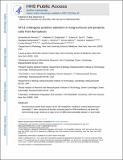NFS1 undergoes positive selection in lung tumours and protects cells from ferroptosis
Author(s)
Alvarez, Samantha W.; Sviderskiy, Vladislav O.; Terzi, Erdem M.; Papagiannakopoulos, Thales; Moreira, Andre L.; Adams, Sylvia; Birsoy, Kıvanç; Sabatini, David; Possemato, Richard; ... Show more Show less
Downloadnihms937625.pdf (4.568Mb)
PUBLISHER_POLICY
Publisher Policy
Article is made available in accordance with the publisher's policy and may be subject to US copyright law. Please refer to the publisher's site for terms of use.
Terms of use
Metadata
Show full item recordAbstract
Environmental nutrient levels impact cancer cell metabolism, resulting in context-dependent gene essentiality. Here, using loss-of-function screening based on RNA interference, we show that environmental oxygen levels are a major driver of differential essentiality between in vitro model systems and in vivo tumours. Above the 3-8% oxygen concentration typical of most tissues, we find that cancer cells depend on high levels of the iron-sulfur cluster biosynthetic enzyme NFS1. Mammary or subcutaneous tumours grow despite suppression of NFS1, whereas metastatic or primary lung tumours do not. Consistent with a role in surviving the high oxygen environment of incipient lung tumours, NFS1 lies in a region of genomic amplification present in lung adenocarcinoma and is most highly expressed in well-differentiated adenocarcinomas. NFS1 activity is particularly important for maintaining the iron-sulfur co-factors present in multiple cell-essential proteins upon exposure to oxygen compared to other forms of oxidative damage. Furthermore, insufficient iron-sulfur cluster maintenance robustly activates the iron-starvation response and, in combination with inhibition of glutathione biosynthesis, triggers ferroptosis, a non-apoptotic form of cell death. Suppression of NFS1 cooperates with inhibition of cysteine transport to trigger ferroptosis in vitro and slow tumour growth. Therefore, lung adenocarcinomas select for expression of a pathway that confers resistance to high oxygen tension and protects cells from undergoing ferroptosis in response to oxidative damage.
Date issued
2017-11Department
Massachusetts Institute of Technology. Department of Biology; Koch Institute for Integrative Cancer Research at MITJournal
Nature
Publisher
Nature Publishing Group
Citation
Alvarez, Samantha W. et al. “NFS1 Undergoes Positive Selection in Lung Tumours and Protects Cells from Ferroptosis.” Nature (November 2017) © 2017 Macmillan Publishers Limited, part of Springer Nature
Version: Author's final manuscript
ISSN
0028-0836
1476-4687